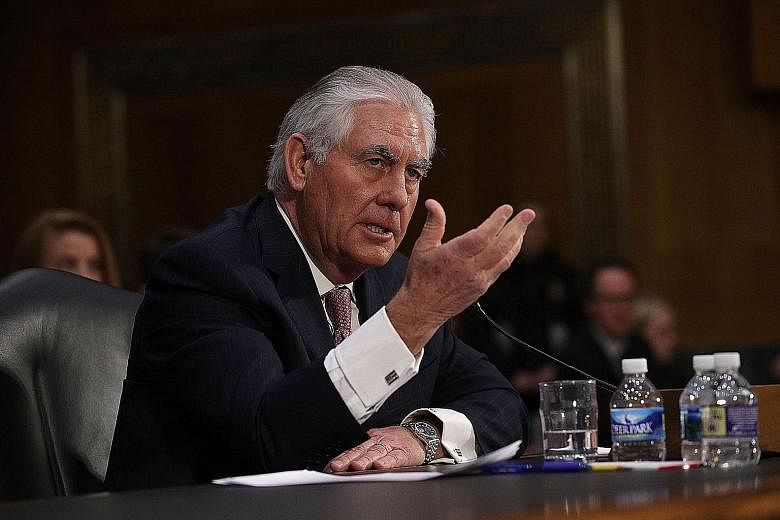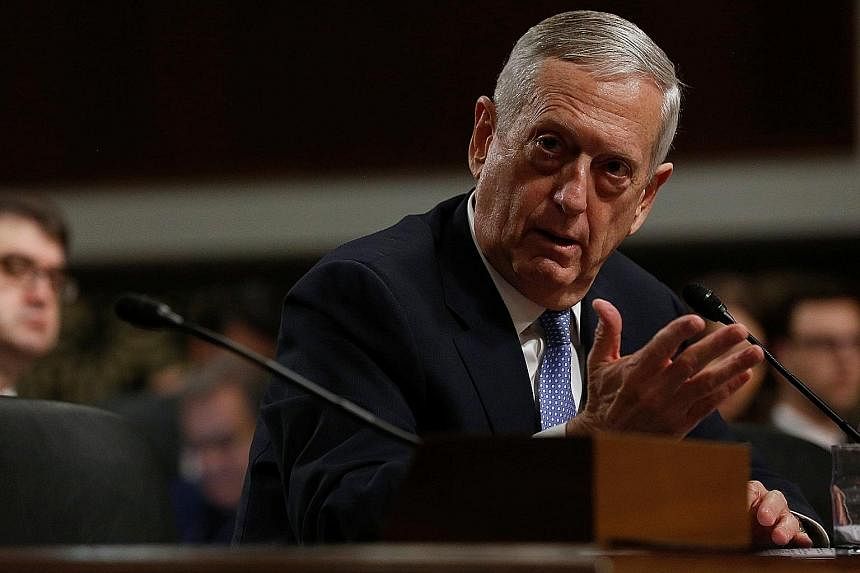WASHINGTON • The incoming United States administration's tough talk against China has set the stage for showdowns on everything from security to trade to cyberspace.
But contradictory signals are sowing uncertainty over how far President-elect Donald Trump is prepared to go in confronting Beijing.
Highlighting the contested South China Sea as a potential flashpoint, Mr Trump's secretary of state nominee Rex Tillerson threw out an explosive challenge to China last Wednesday by calling for it to be denied access to artificial islands it is building in the strategic waterway.
A Trump transition adviser said that Mr Tillerson, Mr Trump's pick to be America's top diplomat, did not mean to suggest the new administration would impose a naval blockade, which would risk armed confrontation with China, something the new administration was not seeking.
But another official authorised to speak on behalf of the transition team pushed back on that view, saying Mr Tillerson "did not misspeak" when he said that China should be barred from its man-made islands.
Amid the conflicting signals on policy, the team appears to be making progress on plans for a major naval build-up in East Asia to counter China's rise.
The transition adviser revealed specifics under consideration - such as basing a second aircraft carrier in the region, deploying more destroyers, attack submarines and missile defence batteries, and expanding or adding new bases in Japan and Australia.
It is also looking at installing "air force long-range strike assets" in South Korea, bordering China's nuclear-armed neighbour North Korea, said the adviser, who spoke on condition of anonymity.
Mr Trump, who succeeds President Barack Obama on Friday, has vowed to greatly expand the US Navy to 350 ships.
But his transition team has not made clear how he will fund this, amid other massive spending plans.
Mr Trump's pick for defence secretary, retired Marine Corps General James Mattis, did not endorse Mr Tillerson's message on the South China Sea, which would seem at odds with Washington's own longstanding commitment to freedom of navigation for all.
Asked about the remarks at his confirmation hearing last Thursday, Gen Mattis said China's actions in the South China Sea were part of a broader attack on the world order.
But he said the State, Defence and Treasury departments needed to put together an integrated policy "so we are not dealing with an incomplete or an incoherent strategy".
A former US official, who has informally advised Mr Trump's transition team, said it may not have fully thought through the risks of any new US military or trade pressure on China.
"We should not underestimate China's willingness to retaliate in kind," said the official, who spoke on condition of anonymity.
As part of a drive to protect American jobs, Mr Trump has threatened to declare China a currency manipulator - even though economists say Beijing has been seeking to prop up, not weaken, its currency.
He has also threatened to slap punitive tariffs on Chinese goods, risking a trade war that could hurt both countries and the global economy.
He has appointed two harsh China critics to his trade team - Mr Peter Navarro, an academic who authored a book titled Death By China, and Mr Robert Lighthizer, a former Reagan administration official.
Mr Trump and his Cabinet nominees have also vowed to step up pressure on China to rein in North Korea's nuclear and missile programmes, including by holding out the possibility of "secondary sanctions" on Chinese entities found to be violating sanctions on Pyongyang.
But analysts say China may be in no mood to cooperate if Washington is leaning on it on other issues.
Those issues include US pressure on Beijing to curb cyber hacking of US entities.
The analysts say confronting Beijing over hot-button nationalist issues like Taiwan and the South China Sea could also trigger strong reactions, especially in a year when President Xi Jinping is seeking to further consolidate power at a congress of the ruling Communist Party, held every five years.
An influential Chinese state-run tabloid warned last Friday that blocking Chinese access to South China Sea islands would require the United States to "wage war".
Dr Zha Daojiong, a professor at Peking University, said the theme of clash of civilisations was becoming increasingly popular in Chinese circles and this was ominous.
"This does not bode well at all... and it means that the continued war drums from America on the South China Sea would not help matters at all," he added.
REUTERS


